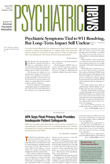As an APA member, I wish to contribute my thoughts on the current low morale in the Association, including the low turnout (31 percent, the lowest on record) in the recent presidential election.
In my area, we have large allotments of membership fees to the state association and county district branch, much of whose activities seem of little use to the average member. Sure, showing films with discussion by academics may serve a purpose, and sure it’s nice to have several offices to call in Manhattan, resident awards, and multiple journals at all levels of the organization. But in reality how much of all this is APA’s job and how much the medical schools’?
On a national level, do we really need APA sponsoring caucuses and groups for minority, underrepresented, and international medical graduate groups, as well as for early career and gay and lesbian issues? There is no question that these groups at times help to clarify important issues and to advocate against injustices. But given that so many of us are already in several of these categories, do we really need to keep up this number of committees and caucuses and working groups? In the past APA journals showed excessive concern about the limited number of American recruits into the specialty, but this seems to have largely resolved.
As a member, I already feel alienated in that the organization is getting so wrapped up in so many activities that often its eyes are not on the ball. It is also expensive, particularly when I am paying about as much for state and county dues as for national dues, and I also subscribe to three other professional organizations.
APA needs to engage in the central problems that occupy us. Changing its name to the American Medical Psychiatric Association would have only added to the confusion. We have been and will be known as psychiatrists and need make no apology for this. We do need to have effective public education on the Web and in doctors’ offices—why not have inserts in our journals, to be freely copied?
We need APA to help us simplify documentation of treatment plans, charting, and insurance claims. We need to stop calling the work we do with patients “med visits.” I have found it exceedingly hard to treat any seriously psychiatrically ill patient pharmacologically, regardless of the presence of other therapists, by just “doing med backup.” We need to trim the organization, including the multiple accretions gathered over the years. Of course, this would not have guaranteed success in individual issues such as the appalling psychologist prescribing debacle in New Mexico, but it could have helped to retain members and to focus on the major issues.
